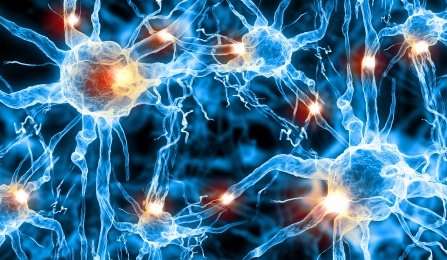Breakthrough discovery in neurotransmission

Samir Haj-Dahmane, Ph.D., senior research scientist at the University at Buffalo Research Institute on Addictions, has discovered how certain neurotransmitters are transported and reach their targets in the brain, which could lead to new drug therapies to help anxiety and other negative brain functions.
In a study published this week by the Proceedings of the National Academy of Sciences, researchers from RIA and Stony Brook University show that a particular protein, known as fatty-acid-binding protein 5 (FABP5), is key to how endocannabinoids travel from neurons to receptors in the brain. This research, led by Haj-Dahmane, was supported by the National Institutes of Health and SUNY REACH (Research Excellence in Academic Health).
Endocannabinoids are naturally produced lipids in the brain that control numerous physiological and behaviors functions, including emotions, stress, pain, motor control and cognition. Released from brain cells, endocannabinoids must travel through a liquid environment to reach and activate cannabinoid receptors and produce their physiological effects.
"For nearly 40 years, a long-standing question in the field of endocannabinoid research is how these lipids can travel through an aqueous (water-like) environment and reach their specific targets," Haj-Dahmane says. "Our research identifies FABP5 as the critical element in achieving this process."
This new discovery is a breakthrough in the current understanding of endocannabinoid function in the brain, which is significant because of the multiple physiological and behaviors function of the endocannabinoid system, including stress, addiction, memory, appetite and pain regulation.
"Given the growing interest in the therapeutic potential of endocannabinoids, it is very likely that FABP5 will be the focus of future translational research to develop drug therapies for psychiatric and neurological disorders involving this system," Haj-Dahmane says.
More information: Fatty-acid–binding protein 5 controls retrograde endocannabinoid signaling at central glutamate synapses, Proceedings of the National Academy of Sciences (2018). www.pnas.org/cgi/doi/10.1073/pnas.1721339115

















